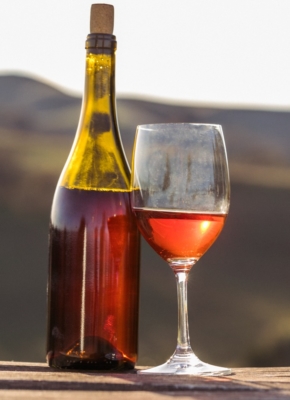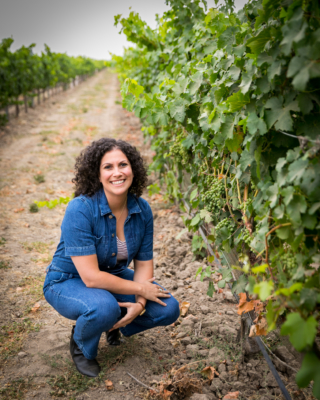What is Natural Wine?
You have probably been hearing the term “natural wine” thrown around the bar these days. Like many of the buzzwords that float around the food & beverage world, the term “natural wine” might just sound like a cheap marketing term.
You may think “it’s wine! It’s made from grapes! Of course it’s ‘natural.’”And while you are partially right, you are also partially wrong.
Not all wine is created equal, and I’d love to help shed some light on these new terms floating around the watering hole.
So what is natural wine exactly? The term “natural wine” refers to how the wine is made. A natural wine maker simply relies on the already fermented grape juice in the fruit and the yeast on the skins of the grapes in order to produce the wine.
This term goes back to the late 19th and early 20th centuries and it has been connected with the Lebensreform social movement over in Germany. After World War II, pesticides in agriculture were becoming increasingly common and the prevalence of natural wine grew as a way to go back more to the original roots of the wine fermentation process (at least in a more eco-friendly manner).
This approach is also called “low-intervention” wine making, since the conventional wine- maker does not add anything to manipulate the wine or the fermentation process.
Believe it or not, many wine producers manipulate their wines by adding dyes, commercial yeasts, additional sugars, acids and more. Many even use methods to filter their wines that involve animal products (vegans, beware!).
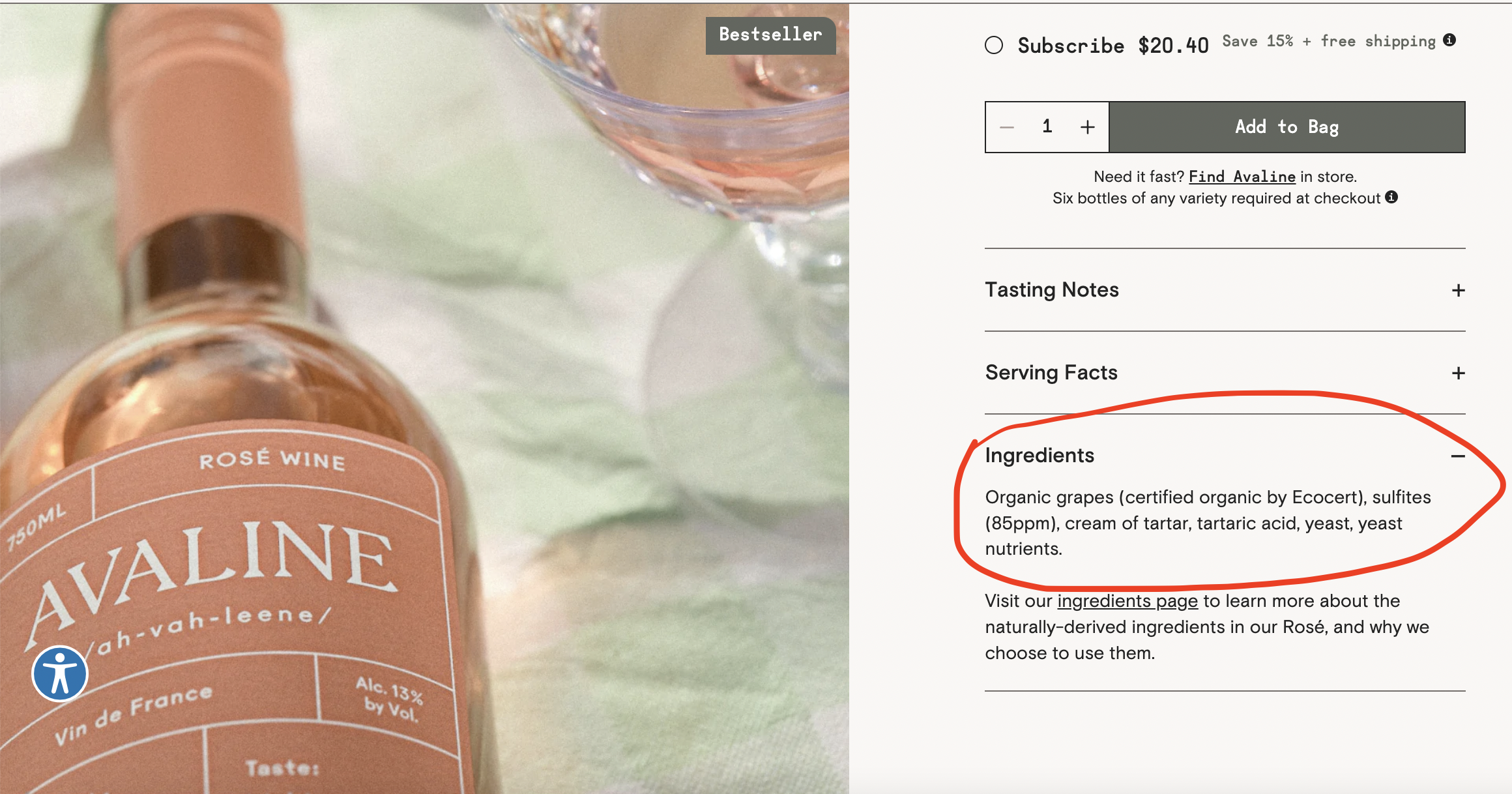
Cameron Diaz’s new wine line, Avaline, tries to capitalize on the natural wine movement but produces wine with several additives.
What’s worse is that these additives are often the root cause of the “wine headache” that many people complain about. Unfortunately, these people avoid drinking wine all together because of the affects of the additives in wine and don’t even know it’s the additives to blame.
Sorry, Cameron Diaz, your new angle for selling wine isn’t cutting it.
So, is natural wine better for you? Well, yes and no. Alcohol, at the end of the day, is a toxin and you are responsible for evaluating that intake on your body and health.
However, avoiding a headache when you can and consuming real ingredients found in the natural world sounds “better” to me.
That’s the natural wine difference. Doesn’t it sound better to you?
Why Use Additives in Wine?
Well, to begin, it comes down to supply, demand, and profit (like almost anything else). There are a lot of major wine producers who are in high demand, and their customers expect their wine to taste the same each year. However, Nature doesn’t play that game.
No one can plan the same weather conditions year after year in order to create the same wine year after year.
It’s for this exact reason that there is such an emphasis on “vintage” (the year a wine was grown & harvested). That’s why you’ll see two identical wines from the same producer be priced differently. A major reason could be that the vintages are different.
One might drink better than the other because the growing season was better. This could mean more rain, more sunshine, less rain, less sunshine, no frost, some frost…the list goes on and on because different wines thrive in different conditions.
But the fact of the matter is, wine changes with each year and many producers and consumers don’t want to rely on what a given growing season will bring. Many search for and expect familiarity with their wines.
Unfortunately, that means reaching for some extra help from the not-so-natural world.
Natural wines, on the other hand, embrace the spontaneity that each grape growing season brings. Each single varietal wine will indicate how the soil health was in a given year. The “natural wine taste” captures the weather conditions of its respective vintage.
You’re literally bottling up a year of sunshine, rainstorms, and soil. Isn’t that cool?
Why We Make Natural Wine
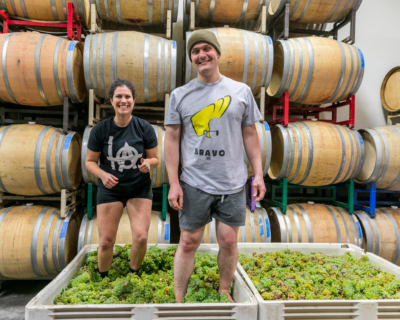
Photo by Nick Gingold
At Más Allá Wines, we make natural wine because we believe that there should be more natural wine in the world.
There was a point in time where my husband and I had to ask ourselves “What is natural wine to us?”
We initially wanted to go as old school as possible and try and find a winemaker who would help us make wine without even the addition of sulfites.
We quickly learned about how risky it is to avoid adding sulfites in our wine, so we reconciled with adding about 20 ppm of sulfites to our wine and were happy about it.
And while we do not currently operate our wine fridge our own facility, we work with wine makers and wine growers who share our philosophy and love of low-intervention wine.
It pains us to know that there are wines out there filled with junky ingredients that people blindly consume.
We are delighted to introduce our wines like our 2020 Rosé of Cabernet Franc to customers and watch their faces light up when they learn that the wine is not only organic, but it is also naturally made and free from additives…and it’s also delicious.
It’s why we got into the game and why we’re still playing.
Unlike some other natural wine brands who are able to manage their own vineyards and winemaking facilities, we are a natural wine company that has the unique opportunity to lift up environmentally friendly vineyards and who are doing smart work in the fields.
Cue our delicious 2020 Cabernet Franc made with organic grapes from Coquelicot Estate Vineyard.
We get to be picky about our grape selection, which means we are taking extra care to bring you, the consumer, a beautiful bottle of classically styled, naturally made wine.
Natural Wines v. Organic and Biodynamic Wines
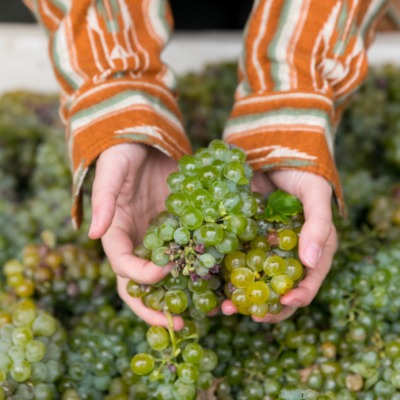
Photo by Nick Gingold
You may have heard “natural wine,” “organic wine,” or “biodynamic wine” as popular wine identifiers if you’ve elbowed up to a local wine bar recently. However, these terms are not interchangeable and do, in fact, carry different meanings.
Natural Wine
Wine that is made using low-intervention techniques and no additives (oftentimes with the exception of sulfites).
Organic Wine
Wine made with organic grape juice and grapes from certified organic vineyards. This means that the vineyard managers only use organic and environmentally-friendly pesticides and herbicides to help protect their vineyard(s) in the growing season.
Can natural wine also be organic wine? YES.
Is all natural wine organic? NO.
Biodynamic Wine
Wine made with grapes from biodynamic vineyards. Now, this is very different from a mere organic vineyard. There are many elements involved in creating a biodynamic vineyard, but the gist is rooted in creating a biodynamic environment around the vineyard.
Biodynamic vineyard managers are heavily invested in the soil health and overall ecosystem of the vineyard. They understand how adding things like a cow horn stuffed with cow manure from a lactating cow can enrich the soil.
Sound a little eccentric? Well, it kinda is. Deal with it. It yields delicious wine and helps heal, revitalize, and strengthen the soil.
Can natural wine be biodynamic? YES.
Is all natural wine biodynamic? NO.
Can biodynamic wine be “organic”? YES
Where You Can Find Our Natural Wine
Visit our online SHOP or, if you’re local to San Diego, visit The Fishery to get some delicious seafood and try our 2020 Chenin Blanc from Jurassic Park Vineyard.
Final Thoughts
If you still want to learn more about natural wine, my biggest recommendation is to go and try some out! Find a local wine bar and ask your bartender if they have any natural wine. Odds are, they probably do since it’s rather trendy.
Or, better yet, buy a bottle of mass produced white wine and a bottle of natural wine and have a blind tasting. Your palate will certainly find that out before you take a second sip.
Subscribe to Our Newsletter
If you’re wondering how to make natural wine, well, you’ll just have to stay tuned and keep an eye out for future articles.
If you learned something from this article and/or would like to stay updated on future pieces of wine writing from yours truly, please sign up for our newsletter.
Not only will you be first to read future work, but you’ll also stay up to date on upcoming wine releases, wine tastings, future wine paired dinners, and more.
About the Author
Cleo de la Torre is the owner of Más Allá Wines. She is also a mother and former high school English teacher. She taught for several years before she and her husband, Jordan, took a wild leap into the wine world.
She loves wine and its rich history, and much of that love is explored and explained through her blog. Questions, comments or concerns? You can reach Cleo here.
